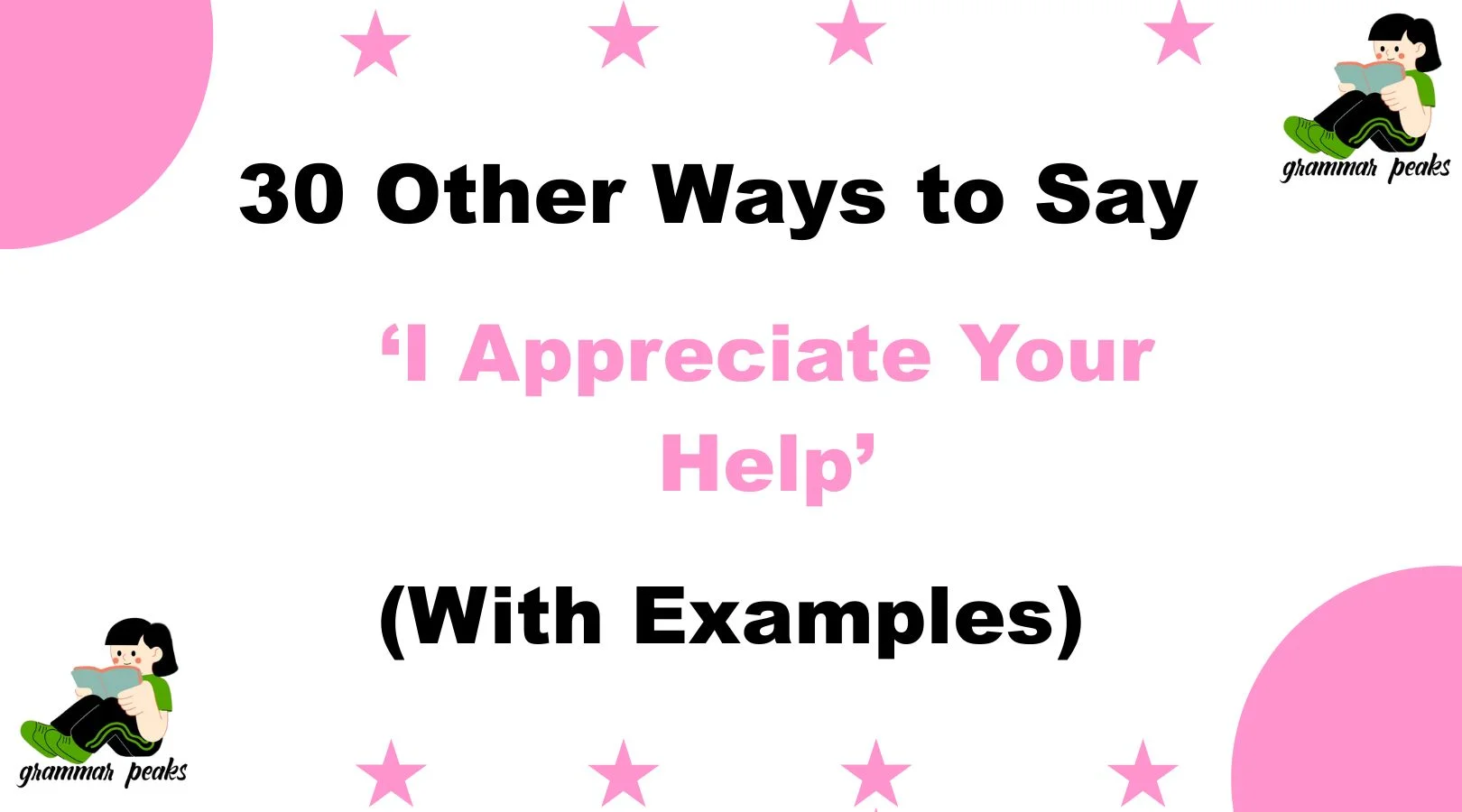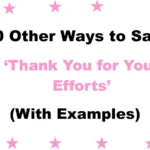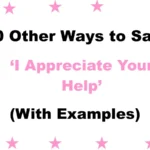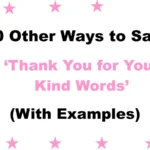Expressing gratitude with the right words can transform a simple thank-you into a heartfelt message that resonates. Whether you’re thanking a colleague for covering your shift, a friend for lending an ear, or a mentor for their guidance, choosing the perfect phrase adds warmth and genuine care.
In this article, you’ll find 30 fresh, thoughtful alternatives to “I appreciate your help”, each with definitions, scenarios, and tips on when (and when not) to use them. Let’s make your next thank-you feel truly personal.
What Does “I Appreciate Your Help” Mean?
The phrase “I appreciate your help” means that you are grateful for someone’s support, effort, or assistance. It’s a way to recognise that someone took the time to do something for you, and you genuinely value it.
This expression conveys respect, thankfulness, and acknowledgment, making it a kind and thoughtful way to show gratitude in both personal and professional interactions. It emphasizes not just the outcome, but also the person’s willingness to help.
When to Use “I Appreciate Your Help”
You can use “I appreciate your help” anytime someone offers support, whether at work, in school, or in daily life. It’s perfect for both casual and professional settings where you want to express genuine gratitude. This phrase helps you sound polite, respectful, and thoughtful without being too formal.
Is It Professional/Polite to Say “I Appreciate Your Help”?
Yes, “I appreciate your help” is both professional and polite, making it a safe and respectful choice in most settings. It strikes a balance between formality and warmth, which is ideal for emails, meetings, or everyday workplace conversations. Whether you’re speaking to a manager, team member, client, or colleague, this phrase shows gratitude without being too casual or overly emotional.
It reflects emotional intelligence and good manners—two qualities highly valued in professional communication. Just be mindful not to overuse it; varying your expressions of thanks can help you sound more intentional and authentic.
Pros and Cons of Saying “I Appreciate Your Help”
Pros:
- Warm and polite — It expresses kindness without sounding overly formal.
- Universally understood — Clear and appropriate in both personal and professional settings.
- Acknowledges effort — It focuses on the person’s contribution rather than just the outcome.
- Builds rapport — Helps nurture respectful and grateful relationships.
- Emotionally intelligent — Demonstrates awareness and appreciation in communication.
Cons:
- Can sound repetitive — Overuse may make it feel less sincere or routine.
- Lacks specificity — Doesn’t always highlight what exactly you’re thankful for.
- Too mild in strong gratitude — May not fully capture deeper emotions of gratitude.
- Less impact in creative writing — It may sound generic in storytelling or expressive writing.
- Not always culturally nuanced — Some cultures may value more elaborate or formal expressions.
Synonyms for “I Appreciate Your Help”
- I’m thankful for your support
- I’m indebted to you
- Your assistance means a lot to me
- I’m grateful for your effort
- I can’t thank you enough
- I owe you one
- Much obliged
- Thank you for being there
- I value your assistance
- I appreciate your effort
- Thank you for your guidance
- Your help is greatly appreciated
- I’m so grateful
- Your support has been invaluable
- I truly value your help
- I’m forever grateful
- Your help made a difference
- I acknowledge and appreciate your help
- I appreciate your time and effort
- Thanks a million
- I sincerely appreciate your help
- Thank you for helping me out
- Your assistance has been a blessing
- I am deeply grateful
- I appreciate your kindness
- Your help means the world
- Thank you for your invaluable support
- I appreciate your commitment
- I appreciate all you’ve done
- Your help has been a game-changer
1. I’m Thankful for Your Support
Definition: Expressing gratitude for someone’s backing.
Detailed Explanation: Highlights emotional appreciation and personal warmth.
Scenario Examples: A friend listens when you’re stressed.
Best Use: Personal notes, messages to close colleagues.
Worst Use: Overly formal reports.
Tone: Heartfelt, warm.
2. I’m Indebted to You
Definition: Acknowledging you owe someone for their help.
Detailed Explanation: Conveys a sense of obligation and deep gratitude.
Scenario Examples: A mentor spends extra time coaching you.
Best Use: Formal occasions, tribute speeches.
Worst Use: Casual chit-chat.
Tone: Respectful, earnest.
3. Your Assistance Means a Lot to Me
Definition: Emphasizing the importance of the help received.
Detailed Explanation: Focuses on the impact their support had.
Scenario Examples: A teammate covers your tasks during illness.
Best Use: Emails, thank-you cards.
Worst Use: Brief texts.
Tone: Appreciative, reflective.
4. I’m Grateful for Your Effort
Definition: Recognizing the work someone put in.
Detailed Explanation: A formal but warm way to say thanks.
Scenario Examples: A contractor goes above and beyond on a project.
Best Use: Professional feedback.
Worst Use: Over small favors.
Tone: Sincere, polished.
5. I Can’t Thank You Enough
Definition: Suggesting words fall short of your gratitude.
Detailed Explanation: Conveys overwhelming appreciation.
Scenario Examples: Someone organizes a surprise celebration.
Best Use: Heartfelt moments.
Worst Use: Routine assistance.
Tone: Enthusiastic, emotive.
6. I Owe You One
Definition: A casual way to offer future repayment.
Detailed Explanation: Implies you’ll return the favor.
Scenario Examples: A colleague helps troubleshoot tech issues.
Best Use: Friendly exchanges.
Worst Use: Formal settings.
Tone: Casual, reciprocal.
7. Much Obliged
Definition: A slightly old-fashioned, courteous thank-you.
Detailed Explanation: Formal and succinct.
Scenario Examples: A service provider exceeds expectations.
Best Use: Professional or formal letters.
Worst Use: Informal chats.
Tone: Polite, traditional.
8. Thank You for Being There
Definition: Acknowledging emotional or practical support.
Detailed Explanation: Emphasizes presence and reliability.
Scenario Examples: A friend stays by your side during tough times.
Best Use: Personal relationships.
Worst Use: Work emails.
Tone: Warm, intimate.
9. I Value Your Assistance
Definition: Highlighting the worth of their help.
Detailed Explanation: Professional yet personable.
Scenario Examples: A co-worker mentors you.
Best Use: Workplace feedback.
Worst Use: Quick favors.
Tone: Respectful, balanced.
10. I Appreciate Your Effort
Definition: Directly acknowledging the work someone did.
Detailed Explanation: Focuses on their actions.
Scenario Examples: A volunteer organizes an event.
Best Use: Recognition emails.
Worst Use: Small tasks.
Tone: Appreciative, clear.
11. Thank You for Your Guidance
Definition: Thanking someone for advice or direction.
Detailed Explanation: Perfect for mentors or leaders.
Scenario Examples: A professor offers career advice.
Best Use: Professional development contexts.
Worst Use: Non-advisory favors.
Tone: Respectful, formal.
12. Your Help Is Greatly Appreciated
Definition: Amplifying the standard phrase.
Detailed Explanation: Feels more empathic than the original.
Scenario Examples: A team stays late to finish a project.
Best Use: Group acknowledgments.
Worst Use: Overused one-on-one thanks.
Tone: Emphatic, professional.
13. I’m So Grateful
Definition: A heartfelt version of “I appreciate.”
Detailed Explanation: Expresses deep emotion.
Scenario Examples: A friend gives you emotional support.
Best Use: Close relationships.
Worst Use: Dry, formal notes.
Tone: Warm, personal.
14. Your Support Has Been Invaluable
Definition: Declaring help indispensable.
Detailed Explanation: Highlights critical importance.
Scenario Examples: A partner helps you through a crisis.
Best Use: Significant contributions.
Worst Use: Minor tasks.
Tone: Serious, appreciative.
15. I Truly Value Your Help
Definition: Deeply acknowledging assistance.
Detailed Explanation: More personal than standard thanks.
Scenario Examples: A colleague offers creative input.
Best Use: Professional collaborations.
Worst Use: Everyday favors.
Tone: Genuine, respectful.
16. I’m Forever Grateful
Definition: Indicating lasting appreciation.
Detailed Explanation: Conveys that you’ll remember their help.
Scenario Examples: A friend helps you move across the country.
Best Use: Major life events.
Worst Use: Routine help.
Tone: Emotional, lasting.
17. Your Help Made a Difference
Definition: Showing tangible impact.
Detailed Explanation: Focuses on results of their assistance.
Scenario Examples: A colleague’s feedback improves your work.
Best Use: Outcome-focused thanks.
Worst Use: Vague situations.
Tone: Affirmative, appreciative.
18. I Acknowledge and Appreciate Your Help
Definition: Formal recognition of assistance.
Detailed Explanation: Suitable for official communications.
Scenario Examples: A stakeholder provides resources.
Best Use: Reports, formal letters.
Worst Use: Casual chats.
Tone: Official, respectful.
19. I Appreciate Your Time and Effort
Definition: Thanking both work and investment of hours.
Detailed Explanation: Recognizes time commitment.
Scenario Examples: A mentor reviews your portfolio.
Best Use: Professional acknowledgments.
Worst Use: Quick favors.
Tone: Considerate, polished.
20. Thanks a Million
Definition: Exaggerated, playful gratitude.
Detailed Explanation: Conveys excitement and enthusiasm.
Scenario Examples: A friend surprises you with tickets.
Best Use: Informal, joyful moments.
Worst Use: Formal emails.
Tone: Playful, exuberant.
21. I Sincerely Appreciate Your Help
Definition: Emphasizing genuineness.
Detailed Explanation: Adds formality and truthfulness.
Scenario Examples: A supervisor coaches you through challenges.
Best Use: Professional remarks.
Worst Use: Lighthearted contexts.
Tone: Earnest, formal.
22. Thank You for Helping Me Out
Definition: Casual expression of thanks for assistance.
Detailed Explanation: Friendly and straightforward.
Scenario Examples: A peer lends you notes.
Best Use: Informal peer exchanges.
Worst Use: High-stakes professional settings.
Tone: Casual, friendly.
23. Your Assistance Has Been a Blessing
Definition: Conveying deep, heartfelt gratitude.
Detailed Explanation: Suggests relief or great help.
Scenario Examples: A friend cares for you during illness.
Best Use: Personal, emotional contexts.
Worst Use: Business emails.
Tone: Warm, heartfelt.
24. I Am Deeply Grateful
Definition: Expressing profound appreciation.
Detailed Explanation: Indicates strong emotional thanks.
Scenario Examples: A mentor’s career-changing advice.
Best Use: Significant, heartfelt moments.
Worst Use: Minor favors.
Tone: Serious, heartfelt.
25. I Appreciate Your Kindness
Definition: Thanking someone’s generosity or compassion.
Detailed Explanation: Focuses on the caring aspect of help.
Scenario Examples: A neighbor brings you soup.
Best Use: Personal gestures.
Worst Use: Work tasks.
Tone: Warm, appreciative.
26. Your Help Means the World
Definition: Hyperbolic expression of gratitude.
Detailed Explanation: Emphasizes immense impact.
Scenario Examples: A friend helps plan your wedding.
Best Use: Major personal events.
Worst Use: Everyday assistance.
Tone: Exuberant, heartfelt.
27. Thank You for Your Invaluable Support
Definition: Formal acknowledgment of crucial help.
Detailed Explanation: Highlights indispensability.
Scenario Examples: A team provides resources for your startup.
Best Use: High-stakes projects.
Worst Use: Small favors.
Tone: Professional, respectful.
28. I Appreciate Your Commitment
Definition: Recognizing dedication.
Detailed Explanation: Focuses on their sustained effort.
Scenario Examples: A volunteer works every weekend.
Best Use: Long-term projects.
Worst Use: Single-instance help.
Tone: Respectful, admiring.
29. I Appreciate All You’ve Done
Definition: A broad, encompassing thank-you.
Detailed Explanation: Covers multiple acts of help.
Scenario Examples: A coach guides you through an entire season.
Best Use: Summative acknowledgments.
Worst Use: Isolated favors.
Tone: Reflective, warm.
30. Your Help Has Been a Game-Changer
Definition: Thanking someone for transformative assistance.
Detailed Explanation: Emphasizes significant positive impact.
Scenario Examples: A collaborator revolutionizes your project.
Best Use: Major breakthroughs.
Worst Use: Routine tasks.
Tone: Enthusiastic, appreciative.
Conclusion
Finding the right words to express genuine appreciation can make all the difference in how your message is received. While “I appreciate your help” is a kind and respectful phrase, using thoughtful alternatives can add a personal, heartfelt tone that resonates more deeply. Whether you’re speaking to a colleague, a friend, or a loved one, choosing words that reflect your sincerity and care helps build stronger, more meaningful connections.
By expanding your vocabulary with these warm and versatile expressions, you not only show gratitude—you also show emotional intelligence and thoughtfulness, which are always valued. Keep these phrases close, and use them to communicate with warmth, clarity, and purpose.
FAQs
1. Why should I use alternatives to “I appreciate your help”?
Using alternative phrases adds personal warmth and helps your message feel more sincere and specific. Rather than sounding routine, varied expressions can make your gratitude feel truly heartfelt and intentional.
2. Are these alternatives suitable for professional communication?
Yes, many of the alternatives like “Thank you for your support” or “I value your assistance” are perfect for work emails, client messages, and team chats. Choose the tone based on how formal or casual the relationship is.
3. How can I choose the right alternative for a situation?
Think about your relationship with the person, the tone you want to convey (warm, formal, casual, emotional), and the context. For example, use “I’m so grateful for your help” in a heartfelt situation and “Much appreciated” in a brief thank-you at work.
4. What’s the difference between “I appreciate your help” and “Thank you”?
“Thank you” is often a quick, general expression of gratitude, while “I appreciate your help” emphasizes the effort or support someone has provided. It’s a bit more specific and emotionally aware.
5. Can I use these expressions in emails or texts?
Absolutely. All these alternatives can be used in written and spoken communication, including emails, texts, letters, and casual chats. Just make sure the tone fits the medium and context.

Mariah Cannon is a dedicated Senior Content Specialist at GrammarPeaks, known for her clear, engaging writing and deep knowledge of English grammar and usage. With a background in linguistics and years of experience in content development, Mariah crafts informative and accessible articles that empower readers to master the nuances of the English language. Her work reflects a commitment to clarity, education, and helping others express themselves with confidence.





